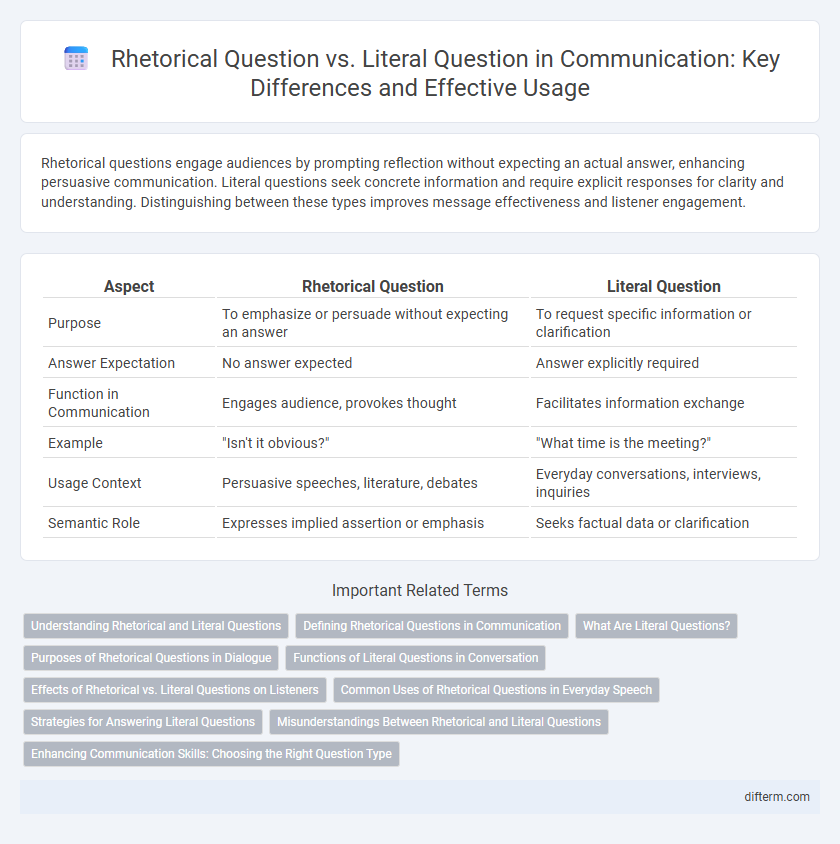Rhetorical questions engage audiences by prompting reflection without expecting an actual answer, enhancing persuasive communication. Literal questions seek concrete information and require explicit responses for clarity and understanding. Distinguishing between these types improves message effectiveness and listener engagement.
Table of Comparison
| Aspect | Rhetorical Question | Literal Question |
|---|---|---|
| Purpose | To emphasize or persuade without expecting an answer | To request specific information or clarification |
| Answer Expectation | No answer expected | Answer explicitly required |
| Function in Communication | Engages audience, provokes thought | Facilitates information exchange |
| Example | "Isn't it obvious?" | "What time is the meeting?" |
| Usage Context | Persuasive speeches, literature, debates | Everyday conversations, interviews, inquiries |
| Semantic Role | Expresses implied assertion or emphasis | Seeks factual data or clarification |
Understanding Rhetorical and Literal Questions
Rhetorical questions are designed to provoke thought or emphasize a point without expecting an answer, often used in speeches and persuasive communication. Literal questions seek specific information or clarification, requiring a direct response to facilitate understanding. Recognizing the intent behind these question types enhances effective communication and prevents misinterpretation.
Defining Rhetorical Questions in Communication
Rhetorical questions in communication are inquiries posed not to elicit information but to emphasize a point or provoke thought, often leaving the answer implied or obvious. Unlike literal questions, which seek specific responses to convey or gather factual information, rhetorical questions serve a persuasive or stylistic function within discourse. Understanding the role of rhetorical questions enhances strategic messaging by engaging audiences emotionally and encouraging reflection without expecting direct answers.
What Are Literal Questions?
Literal questions seek specific, factual answers and are designed to elicit clear, direct information without ambiguity or inference. Unlike rhetorical questions, which imply the answer or provoke thought, literal questions require straightforward responses based on observable or verifiable data. Common examples include queries about time, location, or definitions, emphasizing clarity and precision in communication.
Purposes of Rhetorical Questions in Dialogue
Rhetorical questions in dialogue serve to engage the audience by prompting thought without expecting a direct answer, enhancing persuasive impact and emotional appeal. They emphasize a point, evoke reflection, or highlight contrasts, often making the speaker's argument more memorable. Unlike literal questions that seek information, rhetorical questions function as strategic tools to influence perception and drive the conversation's tone.
Functions of Literal Questions in Conversation
Literal questions in conversation serve to elicit specific information, clarify misunderstandings, and guide the flow of dialogue by seeking direct responses. They function as tools for effective communication by prompting factual answers, confirming details, and facilitating problem-solving or decision-making processes. Unlike rhetorical questions, literal questions prioritize obtaining clear, meaningful content essential for progressing discussions.
Effects of Rhetorical vs. Literal Questions on Listeners
Rhetorical questions engage listeners by prompting internal reflection, enhancing persuasion, and emphasizing key points without requiring direct answers. Literal questions elicit explicit responses, fostering interaction and clarifying understanding through direct information exchange. The strategic use of rhetorical questions often increases audience involvement and emotional impact, while literal questions ensure clarity and active participation in communication.
Common Uses of Rhetorical Questions in Everyday Speech
Rhetorical questions are frequently used in everyday speech to emphasize a point or provoke thought without expecting an actual response. They serve as persuasive tools in conversations, reinforcing opinions or highlighting obvious truths. Common examples include questions like "Isn't that amazing?" or "Who doesn't want success?" which engage listeners and encourage reflection.
Strategies for Answering Literal Questions
Strategies for answering literal questions emphasize clarity by providing precise, fact-based responses derived directly from the communicated information. Effective techniques include identifying keywords, recalling explicit details, and avoiding assumptions to ensure accuracy and relevance. This approach contrasts with rhetorical questions, which do not require direct answers but aim to provoke thought or emphasize a point.
Misunderstandings Between Rhetorical and Literal Questions
Misunderstandings between rhetorical and literal questions often arise when the listener interprets a rhetorical question as seeking factual information, leading to confusion or inappropriate responses. Rhetorical questions are designed to emphasize a point or provoke thought rather than elicit an answer, contrasting with literal questions that expect clear, direct replies. Effective communication requires recognizing these differences to avoid misinterpretation and maintain conversational clarity.
Enhancing Communication Skills: Choosing the Right Question Type
Selecting between rhetorical and literal questions significantly enhances communication skills by aligning the question with the speaker's intent and audience engagement. Rhetorical questions provoke thought and emphasize points without requiring answers, fostering a reflective atmosphere. Literal questions invite explicit responses, facilitating clear information exchange and active dialogue.
rhetorical question vs literal question Infographic

 difterm.com
difterm.com